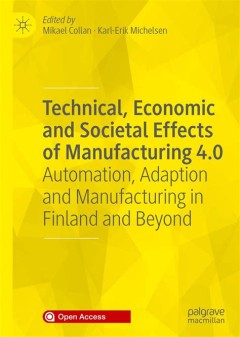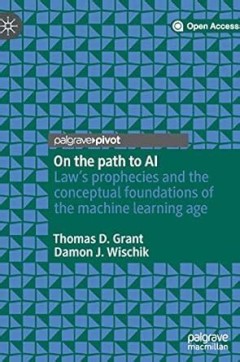Filter by

Automatisierter ÖPNV :Hintergründe und praktische Anleitung zur Umsetzung i…
Dieses Open-Access-Handbuch versteht sich als praktisches Hilfsmittel für den gezielten Einsatz eines automatisierten ÖPNV auf dem Weg zur Mobilitätswende. Es richtet sich in erster Linie an Entscheidungsträger, Verwaltungen kleinerer und größerer Kommunen sowie an Verkehrsbetriebe. Das Handbuch vermittelt der Leserin und dem Leser einen umfassenden Überblick über verschiedene Entwicklu…
- Edition
- 1
- ISBN/ISSN
- 9783662669983
- Collation
- XVII, 322
- Series Title
- -
- Call Number
- -

Managing Infodemics in the 21st Century Addressing New Public Health Challen…
This open access book on infodemic management reviews the current discussions about this evolving area of public health from a variety of perspectives. Infodemic management is an evidence-based practice underpinned by the science of infodemiology that offers guidance to better manage pandemic and epidemic risks and more quickly tackle new and resurgent health threats. Infodemic management ha…
- Edition
- 1
- ISBN/ISSN
- 978-3-031-27789-4
- Collation
- XVIII, 144
- Series Title
- -
- Call Number
- -

Gestaltung vernetzt-flexibler Arbeit = Beiträge aus Theorie und Praxis für …
Dieses Open-Access-Buch umfasst fünfzehn Beiträge aus sechs Verbundvorhaben, die im Rahmen des Förderschwerpunkts „Arbeit in der digitalisierten Welt“ des Bundesministeriums für Bildung und Forschung unterschiedliche Entwicklungen im Transformationsprozess der Arbeitswelt analysieren, konkrete Lösungsansätze entwickeln und wissenschaftlich begleiten und evaluieren. Die Autoren der Bei…
- Edition
- 1
- ISBN/ISSN
- 9783662615607
- Collation
- XIX, 264 hlm; ill., lamp.,
- Series Title
- -
- Call Number
- -

Technical, Economic and Societal Effects of Manufacturing 4.0 = Automation, A…
This open access book is among the first cross-disciplinary works about Manufacturing 4.0. It includes chapters about the technical, the economic, and the social aspects of this important phenomenon. Together the material presented allows the reader to develop a holistic picture of where the manufacturing industry and the parts of the society that depend on it may be going in the future. Manuf…
- Edition
- 1
- ISBN/ISSN
- 9783030461034
- Collation
- XXVIII, 266 hlm; ill., lamp.,
- Series Title
- -
- Call Number
- -

Brain and Human Body Modeling 2020 = Computational Human Models Presented at …
This open access book describes modern applications of computational human modeling in an effort to advance neurology, cancer treatment, and radio-frequency studies including regulatory, safety, and wireless communication fields. Readers working on any application that may expose human subjects to electromagnetic radiation will benefit from this book’s coverage of the latest models and te…
- Edition
- 1
- ISBN/ISSN
- 9783030456238
- Collation
- XI, 407 hlm; ill., lamp.,
- Series Title
- -
- Call Number
- -

Akademische Subjektivierung im Dispositiv neoliberaler Gouvernementalität
In diesem Open-Access Buch wird die Transformation von traditionellen zu unternehmerischen Hochschulen unter einer neoliberalen Wissens- und Identitätspolitik untersucht. Vor dem Hintergrund einer Ökonomisierung der Gesellschaft geraten deutsche Hochschulen und ihre Angehörigen ab den 1990er Jahren zunehmend unter Druck, sich unternehmerisch-manageriale Denk- und Handlungsweisen anzueignen, …
- Edition
- 1
- ISBN/ISSN
- 9783658427474
- Collation
- XV, 351 hlm; ill., lamp.,
- Series Title
- -
- Call Number
- -

On the path to AI = Law’s prophecies and the conceptual foundations of the …
This open access book explores machine learning and its impact on how we make sense of the world. It does so by bringing together two ‘revolutions’ in a surprising analogy: the revolution of machine learning, which has placed computing on the path to artificial intelligence, and the revolution in thinking about the law that was spurred by Oliver Wendell Holmes Jr in the last two decades of …
- Edition
- 1
- ISBN/ISSN
- 9783030435820
- Collation
- XXII, 147 hlm; ill., lamp.,
- Series Title
- -
- Call Number
- -

The Palgrave Handbook of Digital Russia Studies
This open access handbook presents a multidisciplinary and multifaceted perspective on how the ‘digital’ is simultaneously changing Russia and the research methods scholars use to study Russia. It provides a critical update on how Russian society, politics, economy, and culture are reconfigured in the context of ubiquitous connectivity and accounts for the political and societal responses t…
- Edition
- 1
- ISBN/ISSN
- 9783030428556
- Collation
- XXIV, 612 hlm; ill., lamp.,
- Series Title
- -
- Call Number
- -

Preparing for Life in a Digital World = IEA International Computer and Inform…
This Open Access book summarizes the key findings from the second cycle of IEA’s International Computer and Information Literacy Study (ICILS), conducted in 2018. ICILS seeks to establish how well schools around the globe are responding to the need to provide young people with the necessary digital participatory competencies. Effective use of information and communication technologies (ICT) i…
- Edition
- 1
- ISBN/ISSN
- 9783030387815
- Collation
- XXII, 297 hlm; ill., lamp.,
- Series Title
- -
- Call Number
- -

Forensic Genetics in the Governance of Crime
This open access book uses a critical sociological perspective to explore contemporary ways of reformulating the governance of crime through genetics. Through the lens of scientific knowledge and genetic technology, Machado and Granja offer a unique perspective on current trends in crime governance. They explore the place and role of genetics in criminal justice systems, and show how classical …
- Edition
- 1
- ISBN/ISSN
- 9789811524295
- Collation
- IX, 114 hlm; ill., lamp.,
- Series Title
- -
- Call Number
- -
 Computer Science, Information & General Works
Computer Science, Information & General Works  Philosophy & Psychology
Philosophy & Psychology  Religion
Religion  Social Sciences
Social Sciences  Language
Language  Pure Science
Pure Science  Applied Sciences
Applied Sciences  Art & Recreation
Art & Recreation  Literature
Literature  History & Geography
History & Geography